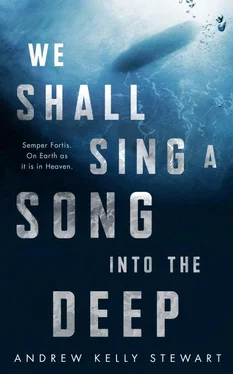Lazlo.
Poor Lazlo.
I won’t let myself imagine what he might be experiencing right now.
Never before has a Chorister been punished so severely, unless their voice failed them.
Having utility, talent, the ability to praise Him with voice has always been enough to spare us before.
And then the logical question that will not quit my mind—that keeps knotting up my heart. Why would the caplain so vehemently try to keep Lazlo silent if there wasn’t some truth in what he said?
There is one person who might know the truth.
THERE ARE FEW TIMES during the day when the boat is quiet, when you could cross from the balneary to the chapel without meeting a fellow brother. During prayers is one of those times. Of course, there would be no opportunity to slip away then. No, the only time is before the hammer is brought against the hull, between the hours of Compline and Matins.
During first sleep.
So, I lay awake in my bunk, waiting for the rhythmic sound of my fellow Choristers’ slumbering breaths.
Then I climb down from my bunk, search with my toes for the deck without making noise.
There are plenty of sounds to mask my footfalls.
Indeed, the mess—the galley is loud as always, Brother Dumas readying the next day’s broth. Hisses. The heavy thwock of the cleaver. Someone always mans the radio, just as with the sonar, the helm, the periscope, especially when the ship is surfaced for venting, when it is at its most vulnerable.
Here, I must slip past quickly.
Past the radio room lies Silas’s old quarters, and then the wardroom, where the elders congregate for their own meals. It is almost always occupied by one or two at any given hour. Quick. Not a breath.
Once I reach the chapel, I light a grease wick, make my way beneath the lower deck, through the lowest part of the boat, where I am often sent, tasked to crawl through the narrow and wet, oily underworks in order to inspect the pressure pipes, hoses, cables, on the hunt for signs of rust or corrosion or seepage.
I step lightly, hunched over, trying not to slosh through the pools of stagnant water as I inch my way forward, careful not to douse my wick—the tiny flame casting just enough light to navigate. I know these underworks better than anyone. Where every conduit and hose and cable leads. The location of the access plates. I find the one I’m looking for above me, the cell in which all who are in need of correction, of discipline, are sent for days of meditation, for prayer and reflection.
These are meant to be times without food or water, without distraction, but I found a way around this some time ago, when Lazlo was locked inside for the whole of a week due to his tardiness in arriving in line for Lauds.
Another of Marston’s punishments. Yes, God could be vengeful, and yes, I was contravening a direct command, bringing a few meager victuals to my friend. But a punishment like this… it just didn’t seem right. Not when life was so difficult to begin with.
Here, in this narrow chamber just above, is where the prisoner is being kept.
This woman.
This interloper with the patch I have seen before. The image that, when closing my eyes, I remember as clearly and vividly as anything.
I unscrew the rusted plate, carefully, softly as the corroded metal will allow. Once it is removed, a mass of bound wiring spills out. Above that, a grating, the gaps of which are only big enough to pass the smallest morsel of food. I can just see up into the darkened chamber by the light of my flame. No sign of the prisoner. But I can smell the human inside.
“Where do you come from?” I whisper up into the darkness. I’m not sure if she is sleeping, if she has heard me. Then I hear a rustling. Sudden, cautious movement.
“Down here,” I whisper. And then I hear the popping of joints, and, by my dim wicklight, wide, gleaming eyes appear on the other side of the grate above.
“Who… who are you?” the interloper asks. Voice raspy. Parched.
Is this a woman? Yes, this voice sounds different than the others.
Cleaner. Higher.
Is this the way my voice will sound? If so, then I will eventually be found out.
“What does the image on your patch mean?” I demand. “What does CPN mean? Tell me, and I’ll give you some water.”
“Patch…” she asks, confused, voice trembling, but louder than I would like.
I shush her. “The one with picture of the tree and the beach and the ocean.”
“Hm,” she grunts. “The emblem for the Coalition of Pacific Nations. CPN. Comes from the old flag of Guam. Have you seen it before?” A new, careful excitement in her voice.
“What is Guam?” I ask.
“An… an island. It was the strategic base—” She stifles a cough. “One of the last strongholds for American forces after the first war. Now it’s the northernmost seat of the Coalition. It’s where I was stationed. Where I set sail from.”
This stream of words means little. The places, these terms. But America. A word spoken of only in the past tense. A place that was. One side of the great war. Where the elders all came from. Caplain Amita told me all about it.
“I thought America was destroyed,” I say.
Silence for a moment. “Large parts of it are… now. Please. Water.”
I had almost forgotten. I feed one end of a rubber tube up, through a gap in the grate, and place the other end inside my canteen containing the half of my water ration I saved this evening.
I hear her slurp down two big gulps.
“Easy,” I say. “You’ll get sick.”
I hear her fast breaths.
“My name is Adolphine,” the interloper says, still heaving.
Her accent is different than anything I’ve ever heard. Thick. Long e ’s.
Adolpheen .
“What is your name?” she asks.
I hesitate.
“You’re just a child,” she presses. Not a question. “You’ve seen this patch before?” she asks, shifting her tack once more, desperation in her voice.
“I remember it… from before I was saved,” I finally say. I shouldn’t be speaking with her, I know. I shouldn’t be out of my bunk. If I am caught, then my fate will be undoubtedly the same as Lazlo’s. But I can’t help it. I have to know.
“Were you trying to kill us?” I ask.
Silence. Her gleaming, dark eyes appear above me again, just on the other side of the grate. I cannot make out the rest of her features. All obscured in darkness.
“No. No, we were not,” she says. “We came to try and help you…” Her voice is tight with tears. I hear her sniffle. “We’d been hailing you for weeks, tracking you. We know that you are hungry—most of your food routes have been cut off…”
“And how do you know that? How do you know about us at all?”
“It was one of you who told us everything. Told us all about your boat. A man named… Calvert. That was his name.”
I suck in a breath. “Brother Calvert. He died. Died during a raid Topside.”
“No, he didn’t. No, he escaped. Made it look like he died in order to flee. I remember meeting him. Looked like a ghost, he was so pale. Thin. Scurvy had already taken him. He lasted a few months in our infirmary back in Guam. But he told us… everything. Everything.”
“Lies,” I whisper. They must be. Why would Calvert just leave us like that? Betray us?
But Adolphine presses: “The Leviathan . That is the name of your boat. Calvert told us about your order. Your prayers. How they b-butcher the boys. It’s called castration, what they do.” She says it in a way that says, I know this happened to you . “They force some of you to work in the reactor room. He told me about the missile.” Her face is pressed down against the grate. Her skin is the color of brown coconut husk, I can see by the flickering flame in my hand. A darker shade than Lazlo’s skin. Than mine.
Читать дальше











